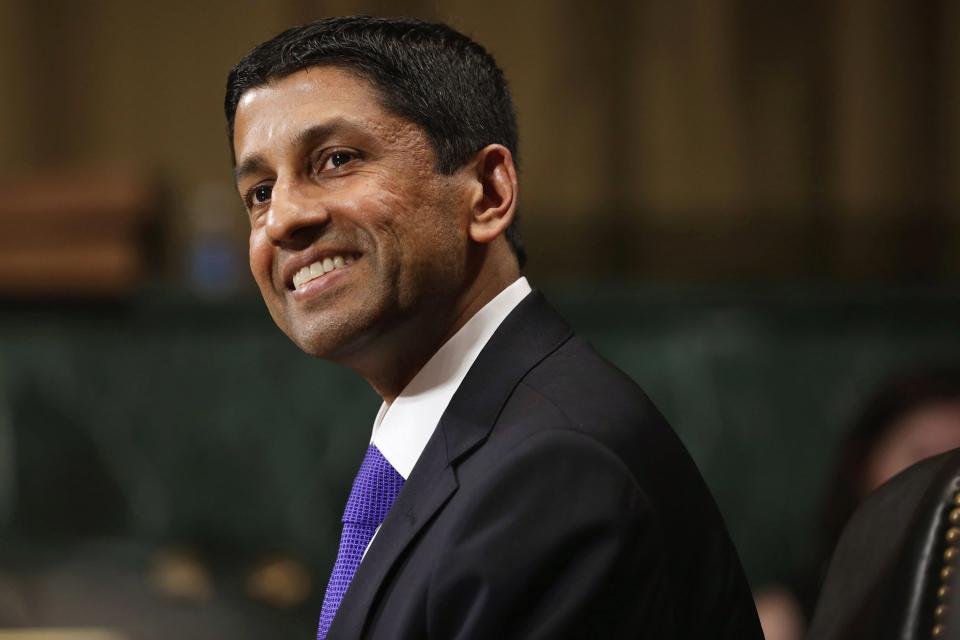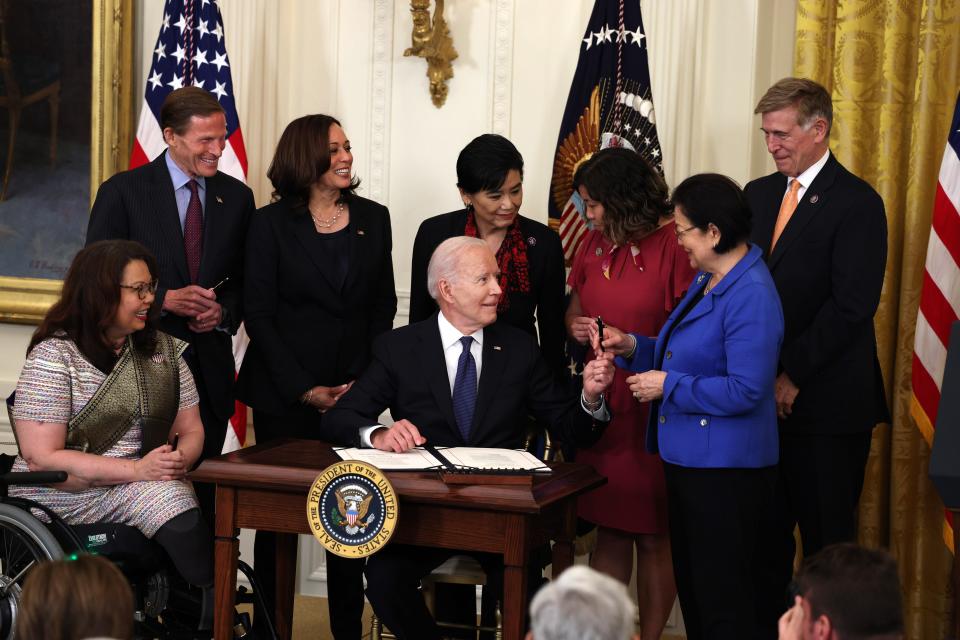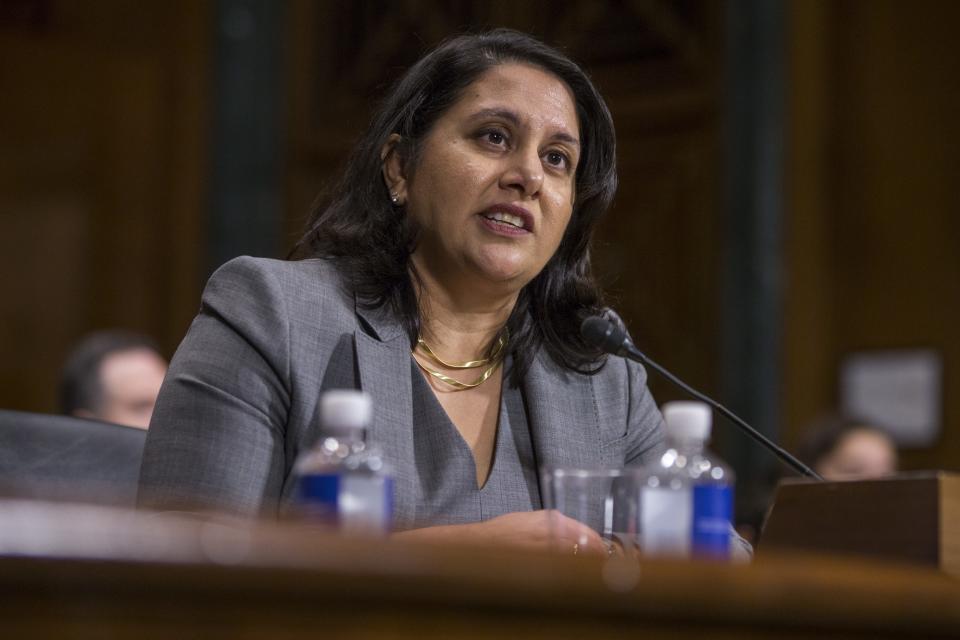Asian American legal groups look to Supreme Court as they pursue path to make history
- Oops!Something went wrong.Please try again later.
- Oops!Something went wrong.Please try again later.
- Oops!Something went wrong.Please try again later.
WASHINGTON – As lawmakers quietly brace for a battle over the next opening on the Supreme Court, some in the Asian American legal community are already looking ahead to the vacancy after that – and what may be the next opportunity to make history.
After having their hopes dashed at the end of President Barack Obama’s term and getting off to a rocky start with President Joe Biden, some are gearing up to push for the first Asian American or Pacific Islander justice on the Supreme Court, as soon as an opportunity arises.
They want Biden to start laying the groundwork.

Eleven appellate judges identify as Asian American or Pacific Islander, including Sri Srinivasan, chief judge of the U.S. Court of Appeals for the District of Columbia Circuit. Srinivasan made Obama’s short list for the Supreme Court in 2016, a fateful nomination that instead went to Merrick Garland before fizzling in the Republican-controlled Senate.
Those 11 judges represent 6% of the 179 authorized appeals court judges – roughly equal to the number of Americans who identify as Asian in census estimates. Twenty-six active U.S. district court judges identify as Asian American or Pacific Islander, according to Federal Judicial Center data, about 3% of the total number of authorized judges.
“It's absolutely right that the Asian American community is gearing up to really push for an Asian American on the Supreme Court, recognizing that there is also a need for an African American and in particular, an African American female,” said John Yang, president of the civil rights group Asian Americans Advancing Justice.
Cabinet: Community leaders decry lack of Asian Americans in Biden's Cabinet picks
Diversity: Biden wants to put a Black woman on the Supreme Court
In the near term, any changes to the court’s composition will hang on Associate Justice Stephen Breyer, 82, who has for months been the center of speculation – and pressure from the left – over his potential retirement. The president vowed to name a Black woman to the Supreme Court for the first time, and he would almost certainly do so to fill Breyer’s seat if Breyer retires during Biden’s time in office.
Breyer hasn't yet signaled his intentions.
'List is thin'
That has left legal advocates in the Asian American community focused on the next opening and ensuring there is a deep pool to draw from when a vacancy occurs. Supreme Court nominees almost always come from appellate courts. Only one current justice didn't hear appeals, Elena Kagan, the former U.S. solicitor general.
"The list is thin on the Democratic side," said Vincent Eng with the National Asian Pacific American Bar Association, who said groups such as his would advocate "strongly" to put an Asian American or Pacific Islander on the Supreme Court. "If you look at the Asian American pool today, there are only four on the appellate court, and one will be on senior status this year.”

Judge Denny Chin, who sits on the New York-based U.S. Court of Appeals for the 2nd Circuit, announced this year that he is taking senior status, or semiretirement.
That small number has created early tension with the Biden administration.
Biden has named a historically diverse Cabinet but has come under fire for not appointing any Asian American or Pacific Islander Cabinet secretaries. Sens. Tammy Duckworth, D-Ill., and Mazie Hirono, D-Hawaii, threatened in March to hold up other administration nominees in the Senate over the lack of Asian American appointments. The senators backed off the threat after receiving assurances from the White House.
AAPI push: Duckworth, Hirono drop threat of opposing nominees
Biden Cabinet: Tracking the confirmation of Biden’s Cabinet members
Administration officials have pointed to Kamala Harris, the first African American and South Asian American woman elected vice president, and Katherine Tai, the first Asian American and woman of color to serve as U.S. trade representative. The trade representative is a Cabinet-level position, but it does not carry the title of secretary.
Biden picks
Several advocates said they recognize and applaud the need for a Black woman on the nation’s highest court – but they point to simmering frustration with a perception that the Asian American community is often told to wait until "next time."
When it comes to judges, the Biden administration is making an effort to diversify the courts – particularly at the federal district level. In his first round of judicial nominations, the president said in March he would name Florence Y. Pan to a seat on the U.S. District Court for the District of Columbia. Pan would be the first Asian American woman to sit on that bench, if confirmed by the Senate.
More: Biden judicial nominees represent diverse professional backgrounds, identities
More: Adding Supreme Court justices? Liberals on collision course with Joe Biden
This month, in his third round of judicial nominees, Biden named Angel Kelley to the U.S. district court in Massachusetts. A state judge, Kelley would be the second African American woman and the second Asian American to serve on that bench. Kelley, who identifies as half Black and half Japanese, told the story this year of how her immigrant mother married a U.S. soldier and came to the USA dead set on assimilation.
Kelley took a different approach.
"I chose to embrace what I could not deny: My ethnic identity," she said during an address to celebrate Martin Luther King Jr. Day. "Thirsty for knowledge of my ancestry, I studied and traveled to Japan. … It was in college where I found strength and confidence in my identity."
District vs. circuit
Though Biden is making inroads at the district court level, naming at least six Asian American or Pacific Islanders to the lower courts, he has yet to name an Asian American or Pacific Islander to an appellate court.
Christopher Kang, a former Obama White House aide who is chief counsel for the left-leaning group Demand Justice, said that may be partly because Biden has work to do adding overall diversity to the federal judiciary.
Kang’s group has sought not just racial diversity but also judges with different professional backgrounds – such as experience as public defenders.
President Donald Trump's appointments were more likely than past presidents' to be white. About 16% of his judicial nominees were Black, Hispanic, Asian or otherwise not white, according to the Pew Research Center. That compares with 18% for President George W. Bush and 36% for Obama.
"The president has a lot of work to do to rebalance the judiciary and make up for the fact that 85% of President Trump's judges were white," said Kang, who called Biden’s early nominees "inspiring" on that front.
Among Biden's early nominees: Four Black women nominated to serve on circuit courts, the first Muslim American to be nominated to a federal court, the first Native American federal judge in Washington state and the second judge from Puerto Rico to sit on the Boston-based U.S. Court of Appeals for the 1st Circuit.
"I do think that there's going to continue to be increased attention on trying to ensure that the Supreme Court reflects the diversity of our country," he said. "And so I would expect a number of Asian American lawyers to get very strong consideration the next time there's a vacancy."
Kang noted the progress: When Obama came into office in 2009, there were no Asian American active circuit court judges.
White House spokesman Andrew Bates said Biden is committed to nominating "strongly qualified nominees" who "represent the diversity of our nation and diverse professional backgrounds." The president, Bates said, "looks forward to nominating more candidates for the federal judiciary who fit those criteria, including from the Asian Americans and Pacific Islanders community.”
Deepening the pool

Trump appointed at least seven Asian Americans or Pacific Islanders to appeals courts, including James C. Ho on the New Orleans-based U.S. Court of Appeals for the 5th Circuit; Amul R. Thapar on the Cincinnati-based 6th Circuit and Neomi Rao on the D.C. Circuit.
It is unlikely, though not impossible, that any of them would be considered by a Democratic president for the Supreme Court.
In addition to Srinivasan, several court observers pointed to Lucy H. Koh, a federal district court judge in California, as a potential Supreme Court nominee. Obama nominated Koh, the first female Korean federal judge, to the San Francisco-based U.S. Court of Appeals for the 9th Circuit, but her nomination expired at the end of his term, and Trump appointed another judge for the slot.
Some pointed to Vince Chhabria and Dolly M. Gee, both federal district court judges in California, among other potential candidates.
"More needs to be done to develop that bench to ensure that we cover all of the different types of attributes that [an] administration looking at a Supreme Court vacancy would want to consider," Yang said.
This article originally appeared on USA TODAY: AAPI groups want Biden to appoint more Asian judges

